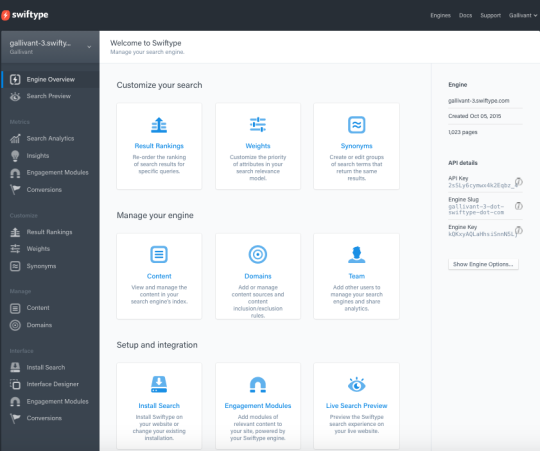
If your business has a beautifully designed and functional website, you might pat yourself on the back. But then ask yourself, “how searchable is it?” Does your website even have a search box?
Matt Riley, CEO of Swiftype, calls the search box the “quickest path from your users’ intent to getting what they want,” and says that visitors to your site who use search are substantially more likely to become customers than those who don’t. So, he says, your site should have a search box.
He’s biased, of course. Swiftype is a company that powers search. Riley and a partner created the business in 2012 through the Y Combinator startup incubator. Today Riley says Swiftype employs 40 people, has created half a million website and app search engines for tens of thousands of customers, and powers 5 billion searches each month. Clients include large companies such as Qualcomm and Dr. Pepper as well as startups Twitch and CloudFlare. Swiftype charges monthly subscription fees based on query volume and the total number of pages that can be searched.
Swiftype’s goal is to help businesses that lack the engineering resources of Google and Amazon to build the same kind of search experience for their own consumers. “We built the company because we think search is one of those few fundamental operations of the Internet,” Riley says. “Everybody is familiar with how good Google search results are and how companies like Amazon and eBay have succeeded in building good internal search engines, but there’s a huge distinction with everywhere else on the Internet. Search is a technology problem that is very difficult to solve.”

Riley told Aabaco Small Business what the typical small business owner needs to know about search.
ASB: What are a few basic things businesses need to know about how customers use search engines?
Riley: Almost half of all searches use three or fewer keywords. People do not type full sentences into search boxes. They type just a few words relevant to what they’re looking for. The best way to support search is with an autocomplete drop-down that appears when you start typing. You also need a way to handle misspellings and figure out what the customer really meant to say.
For instance, if you’re searching for high heels, you might spell it with two words, but someone else will type it as one. The site selling shoes should return the right results for both spellings and misspellings.
Or for an online catalog search, the customer might type in a keyword or a product ID and they could type that in with or without spaces or dashes. For a small business doing a simple website implementation, it’s a challenge to deal with matching the user’s intent to what they type into search box. Those are high-level points that we concentrate on.
ASB: What are the biggest frustrations for consumers searching online?
Riley: The thing we hear about most from consumers is that they do a search and get no results back. It’s especially frustrating if you’re looking for something that you know exists or you saw previously on the site. The most common cause of that is that the search engine is not matching the way user typed the term to way it’s stored.
As soon as a business installs our search engine on its website, we collect all of that information about all of the search terms that are being input, which ones produced no results or results that the user didn’t click on, and which are the top 10 searches on your websites. Our tool also lets you manipulate the search results for specific keywords through the admin interface, so that you can give users the best experience.
ASB: I hear you have a strong opinion about where the search box should be.
Riley: Most people have their search box at the top right of the site, but we think everyone should have it front and center, 800 pixels wide, similar to Facebook’s search box. As companies get better at providing search results, they’re well-served to make the box more prominent. If it’s performing well, it’s going to be a treasure trove of data and you’re going to be giving those people quickly what they want.
ASB: What about that treasure trove of data? How can companies mine search queries?
Riley: A search bar is an extremely unfiltered form of customer feedback—a free text box that asks the searcher to type in exactly what they want. It’s important to pay attention to what searches return no results, which results users are clicking on, and which ones they are not clicking on. If people are searching for a brand you don’t carry, pipe these learnings into your marketing and product strategy.
ASB: Speaking of data, how does Swiftype capitalize on the intelligence it gathers by powering billions of searches every month?
Riley: We don’t use that data for any sort of third party use and we don’t license it. But we do have a treasure trove of data. The way we leverage that is unique to us, but it mimics a bit how Google leverages its own data. It helps us improve our search algorithms.
For instance, remember SOPA (the Stop Online Piracy Act)? Before it was a known acronym, Google used to respond to a search for sopa with, “Did you mean: soap.” But people were typing SOPA more than soap and they weren’t clicking on soap, so Google quickly recognized a new acronym. Google leverages search terms with such great efficiency that it keeps them ahead of the pack.
We analyze queries based on patterns we see across our entire platform. We learn from them and we make changes that we roll out to everyone.
ASB: Are there differences in how people search on a desktop browser versus a mobile device?
Riley: We see a distinct difference. People tend to search more often on mobile and they tend to type longer search terms into mobile. It’s counterintuitive; typing on a phone is cumbersome. But so is navigating websites. Each page takes longer to load. So people want to provide more detail to get more targeted results to avoid having to load several search results. On the mobile-optimized version of your website, you should make the search box prominent and capable of taking the user to the result.
ASB: Have your customers seen significant improvements in revenues after upgrading their site search tools?
Riley: Some of our most successful case studies have been in ecommerce. An example is an online business called UPS Battery Center, which sells about 12,000 kinds of replacement batteries for cars and different devices. Users are searching for products using ID numbers for very specific battery replacements.
All we did was replace the software that handles how his search box behaves. It looks the same, but rather than hitting the Magento software, we figure out which results are relevant and return those to the user. After we took over the search box, their orders increased by 140 percent, their revenue increased by 125 percent, and daily calls to their help desk by customers who couldn’t find what they were looking for on the site decreased by a factor of 10, freeing up the UPS Battery Center team to work on high value customer service.
ASB: Besides the obvious usefulness of this for ecommerce businesses, what other types of websites can benefit from improved search?
Riley: We have a few different verticals. Search is everywhere. But ecommerce is only a small part of our business. Another is self-service help centers and FAQ knowledge bases, such as Airbnb or Shopify or any site where users are looking for answers without having to phone in to the call center. News publications make up our other largest vertical. We run search for TechCrunch, Engadget, NBCUniversal, Deadline|Hollywood, and all kinds of media driving user engagement.
We also have a few businesses that are running smaller ecommerce sites – jewelry sites, recipe blogs. We acquire a lot of smaller businesses via the Shopify platform. With a two-click addition of our software to their store, we take control of the search box and create a login so they can administer it through our dashboard (shown above).
- Type article
- Author Adrienne Burke
- Image https://56.media.tumblr.com/4c713c4b1163a83a185858b11e3fe76a/tumblr_inline_o3uldwgAWN1si4p7w_540.jpg
- Provider Yahoo Small Business Advisor




